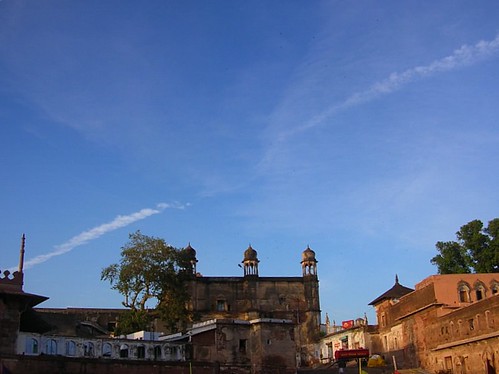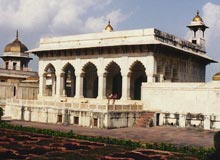
Bhopal, capital of Madhya Pradesh, combines scenic beauty, historicity and modern urban planning. It is situated on the site of an 11th Century city, Bhojapal, founded by Raja Bhoja. The Founder of the existing city was, howeaver an Afghan Soldier of Fortune, Dost Mohammed (1708 - 1740). Fleeing from Delhi in the Chaotic period that followed Aurangzeb's death, Dost Mohammed met the Gond Queen Kamlapati, who sought his aid after the murder of her consort. A charming legend relates how the queen would recline in a lotus barge that, would drift across the lake on moonlit nights. The two lakes of Bhopal still dominate the city, and are indeed in nucleas. Bordering along their shores stand silent sentinels that testify to the growth of a city. Bhopal today presents a multi-faceted profile; the old city with its teeming marketplace and fine old mosques and palaces, still bears the aristocratic imprint of its former rulers, among them the succession of powerful Begums who ruled Bhopal from 1819 to 1926. Equally impressive is the new city with its verdant, exquisitely laid out parks and gardens, broad avenues and streamlined modern edifices
TAJ - UL - MASAJID

said to be the largest mosque in Asia, the building of this towering edifice was begun by Shah Jahan Begum (1868 - 1901) But was incomplete on her death. This great queen, Bhopal's eighth ruler, left many monuments in the city and to her goes the credit for Bhopal's postal system, railways and waterworks. After her death, lack of funds prevented the completion of the masjid and construction was resumed only in 1971. The most striking features of the mosque are the impressive main hall with its inter-arched room, broad facade, spacious courtyard and smooth marrble floors. A three - day Ijtima congregation held here annually draws people from all over the country.
JAMA MASJID

Gold Spikes crown the minarets of this beautiful mosque built in 1837 by Kudsia Begum
MOTI MASJID

Architecturally skin to Delhi's Jama Masjid, this imposing mosque was built by Sikandar Jehan daughter of Kudsia Begum in 1860.
SHAUKAT MAHAL AND SADAR MANZIL

Situated at the entrance to the Chowk Area in the heart of the walled city. Shaukat Mahal is an Architectural curiosity. Its mixture of styles in occidental idioms sets it apart from the predominantly Islamic architecture of the area. It was designed by a Frenchman, said to be a descendant of an offshoot of the Bourbon Kings of France. Post - Renaissance and Gothic Styles are combined to charming effect here. Nearby is the elegant once - opulent sadar Manzil, Hall of Public Audience of the former rulers of Bhopal.
GOHAR MAHAL

Situated behind Shaukat Mahal on the banks of the upper lake is Gohar Mahal, which is an architectural gem dating back to the times of kudsia Begum, also known as Gohar Begum who built this sprawling palace in 1820. The Mahal is magnificent expression of the fusion of Hindu and Mughal Architecture.